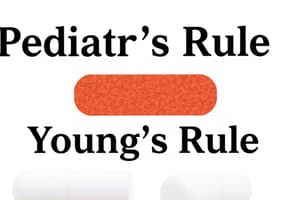Podcast
Questions and Answers
What is the formula for Clark's rule?
What is the formula for Clark's rule?
- Child's dose = Adult Dose x [weight of child (lbs) / 150] (correct)
- Child's dose = Adult Dose x [weight of child (kg) / 100]
- Child's dose = Adult Dose x [Age / 100]
- Child's dose = Adult Dose x [Age / (Age + 12)]
Using Clark's rule, what is the dose for a 12-year-old girl who weighs 31.7kg if the average adult dose is 500mg?
Using Clark's rule, what is the dose for a 12-year-old girl who weighs 31.7kg if the average adult dose is 500mg?
235mg
Using Clark's rule, what dose should be given to an 8-year-old child who weighs 57lbs if the adult dose is 250mg?
Using Clark's rule, what dose should be given to an 8-year-old child who weighs 57lbs if the adult dose is 250mg?
95mg
What is the formula for Young's rule?
What is the formula for Young's rule?
What dose should be given to a 9-year-old child who weighs 63lbs using Young's rule if the adult dose is 200mg?
What dose should be given to a 9-year-old child who weighs 63lbs using Young's rule if the adult dose is 200mg?
Write down the equations for Young's rule and Clark's rule.
Write down the equations for Young's rule and Clark's rule.
Using Clark's rule, what is the dose for an 11-year-old boy who weighs 35.2kg if the average adult dose is 400mg?
Using Clark's rule, what is the dose for an 11-year-old boy who weighs 35.2kg if the average adult dose is 400mg?
If the adult dose is 100mg and a 7-year-old child weighs 40kg, what dose should the child be given using Young's rule?
If the adult dose is 100mg and a 7-year-old child weighs 40kg, what dose should the child be given using Young's rule?
What dose should Sam be administered if he is six times younger than a 42-year-old adult weighing 164lbs who is given 500mg of a drug?
What dose should Sam be administered if he is six times younger than a 42-year-old adult weighing 164lbs who is given 500mg of a drug?
Which formula was used to prescribe a 10-year-old boy weighing 32kg an antibacterial drug at 35mg when the adult dose is 75mg?
Which formula was used to prescribe a 10-year-old boy weighing 32kg an antibacterial drug at 35mg when the adult dose is 75mg?
Flashcards
Clark's Rule Formula
Clark's Rule Formula
Child's dose = Adult Dose x [weight of child (lbs) / 150]
Young's Rule Formula
Young's Rule Formula
Child's dose = Adult Dose x [Age / (Age + 12)]
Clark's and Young's Rules
Clark's and Young's Rules
Adult dose x [weight of child (lbs) / 150 ] = Child's dose; Young's rule: Child's dose = Adult Dose x [Age / (Age + 12)]
Clark's Rule
Clark's Rule
Signup and view all the flashcards
Study Notes
Clark's Rule
- Formula: Adult dose x [weight of child (lbs) / 150] = Child's dose
- Requires child's weight in pounds; convert kg to lbs by multiplying by 2.2.
- Example calculation with 12-year-old girl weighing 31.7 kg results in a dose of 235 mg using an adult dose of 500 mg.
Young's Rule
- Formula: Child's dose = Adult Dose x [Age / (Age + 12)]
- Uses age as the basis for calculation instead of weight.
- Example calculation for a 9-year-old child yielding a dose of 86 mg with an adult dose of 200 mg.
Application of Rules
- 8-year-old child weighing 57 lbs and an adult dose of 250 mg gives a prescribed dose of 95 mg via Clark's rule.
- 11-year-old boy weighing 35.2 kg with a 400 mg adult dose results in a child dose of 206 mg under Clark's rule.
Conversion and Comparison
- Convert kg to lbs before using Clark's rule; Young's rule does not require conversion.
- In case of a pediatric patient who weighs 40 kg and is 7 years old, Young's rule results in a dose of 37 mg from an adult dose of 100 mg.
Special Cases
- Sam, a patient who is six times younger than a 42-year-old adult weighing 164 lbs receiving 500 mg, is prescribed a dose of 184 mg.
- A 10-year-old boy weighing 32 kg and prescribed 35 mg was calculated using Clark's rule; Young's rule would yield a lower dose of 33.75 mg.
Summary of Equations
- Clark's Rule: Adult dose x [weight of child (lbs) / 150] = Child's dose
- Young's Rule: Child's dose = Adult Dose x [Age / (Age + 12)]
Studying That Suits You
Use AI to generate personalized quizzes and flashcards to suit your learning preferences.




